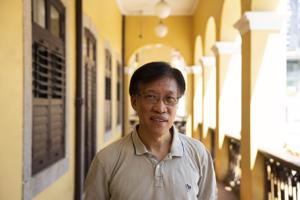In a significant development reflecting tightening political controls, authorities in Macao have apprehended a prominent individual on grave allegations of endangering national security through purported collusion with external entities. This arrest underscores the escalating enforcement of the region’s national security legislation, signaling a pivotal moment in Macao’s post-colonial political evolution under Chinese sovereignty.
Police statements detail the apprehension of a 68-year-old Macao resident, identified by the surname Au, suspected of maintaining illicit associations with an anti-China organization operating beyond the Special Administrative Region’s borders. The detailed accusations include the provision of what authorities describe as “false and seditious materials” intended for public dissemination both online and internationally, aiming to destabilize the political environment.
Further investigation revealed the suspect’s alleged long-term engagement with multiple entities deemed hostile to China, situated outside Macao. These sustained contacts reportedly involved the repeated supply of unverified intelligence to these groups or their associated media platforms, which subsequently broadcasted this information to a broader audience, shaping public perception.
According to police, the primary objective of these alleged activities was to instigate animosity against both China’s central government and the Macao administration among local residents and international observers unfamiliar with the full context. Such actions were explicitly targeted at undermining governmental authority and potentially provoking adversarial responses from foreign nations against Macao’s established order.
Local news outlets across Hong Kong and Macao swiftly identified the detained individual as Au Kam San, a former pro-democracy lawmaker. This marks what is believed to be the inaugural publicly acknowledged arrest under Macao’s national security law, originally enacted in 2009 and subsequently revised in 2023, highlighting the law’s evolving application.
Au Kam San previously served in Macao’s legislative assembly, a body predominantly aligned with Beijing. Despite stepping down in 2021, he remained one of the few vocal critics within the city, frequently expressing dissenting views on government policies and political shifts via platforms like Facebook and through media interviews, maintaining a public profile of independent thought.
Since its return to Chinese administration in 1999, Macao has transformed into the world’s largest gaming hub. Historically, its pro-democracy movement has been less influential compared to that in neighboring Hong Kong, which also reverted to Chinese rule in 1997. Macao has experienced considerably fewer large-scale public demonstrations challenging governmental policies than its counterpart.
However, the past few years have witnessed the implementation of more stringent political controls within the casino hub. This intensification of oversight became particularly pronounced following the extensive anti-government protests that swept Hong Kong in 2019, prompting Beijing to systematically curtail nearly all forms of public dissent across its Special Administrative Regions.
Evidences of this heightened control include the prohibition of the annual vigil commemorating China’s 1989 crackdown on pro-democracy protests. Furthermore, prominent pro-democracy figures were barred from participating in Macao’s 2021 legislative elections, and more recently, an incumbent lawmaker known for his moderate stance was disqualified from this year’s electoral contest, underscoring a consistent trend of diminishing political space.






Leave a Reply